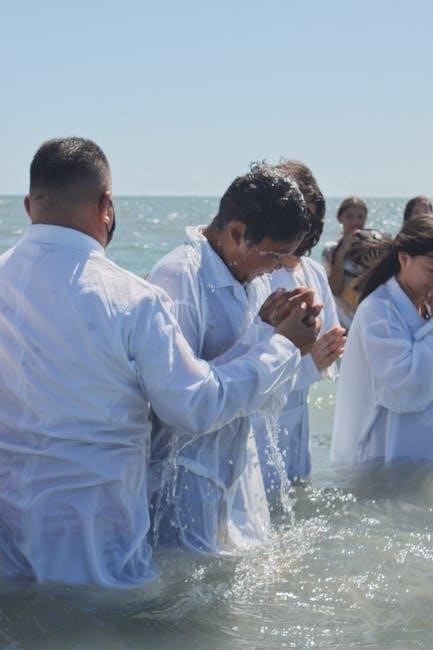The renewal of baptismal promises is a meaningful practice that strengthens faith, often occurring during Lent, Easter, or baptismal anniversaries, reaffirming rejection of sin and commitment to God.
What is the Renewal of Baptismal Promises?
The renewal of baptismal promises is a sacred ritual where individuals reaffirm their commitment to faith, rejecting sin and Satan, and pledging to serve God faithfully. It often occurs during Lent, Easter, or baptismal anniversaries, serving as a spiritual rejuvenation. This practice strengthens believers’ resolve to live according to their baptismal vows, deepening their relationship with God. By reciting the Apostles’ Creed and renouncing evil, participants recommit to their faith journey, embracing the Holy Spirit’s grace and spiritual strength. This renewal is both a personal and communal act, fostering spiritual growth and fidelity to God’s will.
Historical Context of Baptismal Promises
The renewal of baptismal promises traces its roots to early Christianity, where baptism was a pivotal sacrament symbolizing spiritual rebirth. The practice of reaffirming these vows emerged as a way to strengthen faith and commitment, particularly during significant liturgical periods like Easter. Historical records show that the early Church emphasized the renunciation of sin and allegiance to Christ, reflecting the teachings of the New Testament. Over centuries, the ritual evolved, incorporating creeds and formalized vows, with the Holy Spirit playing a central role in sealing these promises. This tradition has been upheld through various Church councils and liturgical reforms, ensuring its enduring significance.
Why Renew Baptismal Promises?
Renewing baptismal promises strengthens spiritual life by reaffirming faith and rejecting sin. It renews the commitment to God and the Church, fostering a deeper connection with Christ. This practice, rooted in Catholic tradition, serves as a reminder of the Holy Spirit’s role in baptism and daily life. By renewing these vows, individuals recommit to living as children of God, embracing the teachings of the Church. It also provides an opportunity for personal reflection and spiritual growth, aligning with the Catechism’s emphasis on baptism as the foundation of Christian life. This renewal revitalizes the promises made during baptism, ensuring they remain central to one’s faith journey.

The Significance of Renewing Baptismal Promises
Renewing baptismal promises reaffirms faith, rejects sin, and renews commitment to serve God and the Church, fostering spiritual growth and deepening one’s relationship with Christ.
Spiritual Renewal and Reaffirmation of Faith
Spiritual renewal through baptismal promises revives the soul, reconnecting believers with God’s grace. This reaffirmation strengthens faith, fostering a deeper commitment to living according to divine will and teachings. It serves as a reminder of the sacred vows made during baptism, empowering individuals to walk in newness of life. By rejecting sin and embracing Christ, believers experience a refreshed dedication to their spiritual journey, aligning their hearts with the Holy Trinity. This renewal ignites a fervent desire to serve God and the Church, enriching both personal and communal faith experiences.
Rejecting Sin and Satan
Rejecting sin and Satan is a cornerstone of renewing baptismal promises, symbolizing liberation from evil’s influence. During the ceremony, the faithful are asked to renounce Satan, his works, and empty promises, affirming their commitment to God. This act reaffirms the baptismal vow to reject sin’s grip and align with divine will. By rejecting darkness, believers embrace the light of Christ, seeking spiritual freedom and a deeper connection with God. This renewal strengthens resolve to live virtuously, guided by the Holy Spirit, and fosters a renewed dedication to serving God and the Church with integrity and devotion.
Commitment to Serve God and the Church
Renewing baptismal promises includes a solemn commitment to serve God and the Church, reaffirming the vows made at baptism. This commitment involves dedicating oneself to live according to God’s will, actively participating in the life of the Church, and contributing to its mission. By promising to serve, believers express their loyalty to Christ and His teachings, striving to uphold the values of faith, hope, and charity. This commitment is a public profession of devotion, encouraging believers to embrace their role in the Church’s community and to work toward the spiritual and temporal well-being of all. It is a lifelong journey of discipleship and love.

Preparation for the Renewal of Baptismal Promises
Preparation involves prayer, reflection, and seeking forgiveness, helping individuals understand and reaffirm their baptismal vows with sincerity, ensuring a meaningful renewal of their commitment to faith.
Prayer and Reflection
Prayer and reflection are essential for preparing to renew baptismal promises, helping individuals reconnect with their faith journey and deepen their commitment to God. Through personal prayer, such as meditating on scripture or examining one’s conscience, believers can reflect on their relationship with God and identify areas for spiritual growth. Reflection also involves gratitude for the grace received in baptism and seeking forgiveness for past shortcomings. This process fosters a renewed sense of purpose and dedication, allowing individuals to approach the renewal of their promises with sincerity and openness to the Holy Spirit’s guidance.
Seeking Forgiveness and Reconciliation
Seeking forgiveness and reconciliation is a vital step in preparing for the renewal of baptismal promises, allowing individuals to cleanse their hearts and minds before reaffirming their commitment to God. This process often involves sacramental confession or personal reflection on past sins, acknowledging shortcomings, and expressing sincere remorse. Through forgiveness, believers experience spiritual healing and renewal, enabling them to approach the renewal of their promises with a pure and contrite heart. This act of reconciliation strengthens their relationship with God and prepares them to fully embrace the grace and responsibilities of their baptismal vows.
Understanding the Baptismal Vows
Understanding the baptismal vows is essential for their renewal, as it deepens one’s faith and commitment. These vows, made during baptism, include renouncing Satan and his works, believing in the Holy Trinity, and promising to serve God faithfully in the Catholic Church. Grasping the meaning of these vows helps individuals reject sin and embrace a life of virtue, aligning their actions with the teachings of Christ. This understanding fosters a renewed dedication to living as children of God, actively participating in the Church, and upholding the principles of faith, hope, and charity in daily life.

The Ritual of Renewal of Baptismal Promises
The ritual involves a leader guiding the congregation through vows, including renouncing Satan and evil, reciting the Apostles’ Creed, and professing faith in the Holy Trinity, strengthening faith and commitment to God.
The Ceremony and Its Elements
The renewal ceremony is a structured liturgical event, often led by a priest or bishop. The congregation stands as the leader guides them through the vows. Key elements include the renunciation of Satan and his works, recitation of the Apostles’ Creed, and profession of faith in the Holy Trinity. The ritual also involves sprinkling holy water, symbolizing purification, and lighting baptismal candles, representing the light of faith. These elements collectively reinforce the rejection of evil and the commitment to follow Christ, deepening the participants’ spiritual connection and reaffirming their baptismal vows.
Recitation of the Apostles’ Creed
The Apostles’ Creed is a cornerstone of the renewal ceremony, serving as a declaration of faith. It reaffirms belief in God the Father, Jesus Christ, and the Holy Spirit, while acknowledging the Church, forgiveness of sins, and eternal life. This creed, rooted in ancient tradition, unites participants in a shared profession of faith, reinforcing their commitment to Christian doctrine. Its recitation strengthens personal and communal faith, bridging the past with present devotion, and is a powerful moment of spiritual renewal in the baptismal promises ritual.
Renouncing Satan and His Works
Renouncing Satan and his works is a solemn moment in the renewal of baptismal promises. The congregation collectively rejects sin and evil, affirming their commitment to God. This act symbolizes spiritual liberation, echoing the original baptismal vows. By rejecting Satan’s influence, believers reaffirm their dedication to living in the freedom of God’s children. The ritual strengthens resolve against temptation and aligns hearts with divine will, marking a powerful step in spiritual renewal and faith reaffirmation. It is a public declaration of allegiance to Christ and His Church, setting the stage for a deeper commitment to living a virtuous life.
Profession of Faith in the Holy Trinity
The profession of faith in the Holy Trinity is a cornerstone of the renewal of baptismal promises, reaffirming belief in God the Father, Jesus Christ, and the Holy Spirit. This declaration, often recited through the Apostles’ Creed, underscores the divine nature of the Trinity and the believer’s commitment to the Christian faith. By professing this faith, individuals affirm their acceptance of the Church’s teachings and the grace received through baptism. The Holy Spirit is invoked for strength and guidance, ensuring the promises made are lived out faithfully. This act deepens unity with God and the Church, reflecting the heart of Christian identity.

The Role of the Holy Spirit in Baptismal Renewal
The Holy Spirit empowers believers to fulfill their baptismal promises, granting grace and spiritual strength for a life of faith, service, and devotion to God.
The Holy Spirit and Baptism
The Holy Spirit plays a vital role in baptism, bestowing grace and spiritual rebirth upon believers. Through baptism, individuals are cleansed from sin and reborn into a life of faith. The Holy Spirit strengthens their commitment to God, empowering them to live according to their baptismal promises. This divine presence fosters a deepening of faith, enabling believers to reject sin and embrace a life of virtue and service. The Spirit’s ongoing guidance and renewal ensure that the promises made during baptism remain a living and active part of one’s journey in the Catholic Church, inspiring holiness and devotion to God’s will.
Grace and Spiritual Strength
Grace and spiritual strength are essential for fulfilling baptismal promises. Through the Holy Spirit, believers receive the divine assistance needed to live a virtuous life. This grace empowers individuals to resist sin and remain faithful to their commitments. Spiritual strength is nurtured through prayer, reflection, and active participation in the Church’s sacraments. By embracing this grace, Christians are able to grow in holiness and serve God with renewed dedication. The renewal of baptismal promises is a powerful reminder of the ongoing need for spiritual fortitude, enabling believers to walk in the light of Christ and bear witness to His love.
The Catholic Church’s Teachings on Baptismal Promises
The Catholic Church teaches that baptismal promises are sacred vows renouncing sin and Satan, affirming faith in the Holy Trinity, and committing to serve God and the Church.
The Catechism of the Catholic Church
The Catechism emphasizes that baptismal promises are a commitment to reject sin and Satan, professing belief in the Holy Trinity and the Church’s teachings, fostering spiritual growth and lifelong discipleship. It highlights the renewal of these vows as a reaffirmation of faith, essential for maintaining a steadfast relationship with God and actively participating in the life of the Church. Through this renewal, believers reaffirm their baptismal identity and commitment to living according to the principles of the Gospel, supported by the sacraments and the grace of the Holy Spirit, as outlined in the Catechism.
The Communion of Saints
The communion of saints is a fundamental aspect of Catholic belief, emphasizing unity among all members of the Church, both living and deceased. This doctrine underscores the shared spiritual bond that connects believers across time and space. In renewing baptismal promises, individuals reaffirm their participation in this communion, acknowledging the intercession of saints and the support of the faithful. This unity reflects the Church’s universal nature and the shared journey toward eternal life, as highlighted in the Catechism of the Catholic Church, which ties baptismal renewal to the forgiveness of sins, the resurrection of the body, and life everlasting.
The Forgiveness of Sins
The renewal of baptismal promises is deeply connected to the forgiveness of sins, a central tenet of Catholic teaching. Through baptism, believers receive cleansing from sin and spiritual rebirth. When renewing these promises, individuals reaffirm their rejection of sin and embrace God’s mercy. The Catechism of the Catholic Church emphasizes that baptism forgives original and personal sins, granting eternal life. This renewal strengthens the faith journey, enabling believers to live virtuously and seek ongoing forgiveness. It underscores the universal call to holiness, reflecting the Church’s belief in the transformative power of God’s grace and the resurrection of the body.

Practical Ways to Live Out Baptismal Promises
Daily prayer, living virtuously, and sharing faith with others are essential practices. These actions reflect a commitment to rejecting sin and serving God faithfully in the Church.
Daily Prayer and Devotion
Daily prayer and devotion are cornerstone practices for living out baptismal promises. Through personal reflection and recitation of prayers, individuals deepen their faith and connection to God. Many Catholics use renewal of baptismal promises PDF guides to structure their devotion, incorporating Scripture and the Apostles’ Creed. Regular prayer fosters a mindset of gratitude and commitment, helping believers reject sin and embrace a life of virtue. This consistent spiritual practice strengthens resolve to serve God and the Church, aligning daily actions with baptismal vows and fostering a deeper understanding of faith.
Living a Life of Virtue
Living a life of virtue is essential to fulfilling baptismal promises, as it reflects a commitment to rejecting sin and embracing God’s will. Virtues such as kindness, humility, and charity guide believers in serving others and living according to Christ’s teachings. The renewal of baptismal promises reinforces this commitment, encouraging individuals to embody faith through moral integrity and selfless actions. By striving for virtue, one demonstrates devotion to God and the Church, fostering personal holiness and contributing to the greater good. This way of life aligns with the teachings of the Catholic Church and the vows made during baptism.
Sharing Faith with Others
Sharing faith with others is a vital aspect of living out baptismal promises, as it reflects a commitment to spreading God’s message. By witnessing to others, believers fulfill their role as disciples and ambassadors of Christ. This can be done through prayer, good deeds, and actively engaging in the life of the Church. Sharing faith strengthens community bonds and inspires others to deepen their relationship with God. It also reinforces one’s own faith and serves as a testament to the transformative power of baptismal promises. Through this, individuals contribute to the Church’s mission and help others embrace the faith.
Cultural and Liturgical Practices
Cultural practices include sprinkling holy water and lighting baptismal candles, symbolizing renewal and spiritual rebirth, often during Easter or Lent, to reaffirm faith commitments publicly.
Baptismal Anniversaries
Baptismal anniversaries offer a meaningful way to celebrate and reaffirm faith, often involving family devotions and the lighting of baptismal candles. These ceremonies provide an opportunity to reflect on the sacrament’s significance and renew promises made during Baptism. Many families incorporate prayers, readings, and hymns into their observances, strengthening their spiritual connection. The renewal of baptismal promises on such occasions reminds individuals of their commitment to rejecting sin and serving God. This practice fosters a deeper understanding of faith and its role in daily life, while also nurturing a sense of community and shared spiritual growth.
Feast of the Baptism of the Lord
The Feast of the Baptism of the Lord is a significant occasion for renewing baptismal promises, often celebrated with special liturgies and rituals. During this feast, the faithful reflect on Jesus’ baptism in the Jordan River, symbolizing purification and divine revelation. Many Catholic communities incorporate the renewal of baptismal promises into the Mass, where participants reaffirm their rejection of sin and commitment to following Christ. Holy water is often blessed and sprinkled on the congregation, reminding them of their baptismal grace. This feast serves as a powerful reminder of the Holy Trinity and the transformative power of Baptism.
Family Devotions
Family devotions play a vital role in nurturing faith and renewing baptismal promises. Many Catholic families observe special prayers and rituals, often lighting baptismal candles to symbolize the light of Christ. Parents and children together reflect on their faith journey, discussing the meaning of baptismal vows. Families may recite the Apostles’ Creed or renew their promises during home devotions, fostering a sense of unity and shared commitment. These practices strengthen family bonds and deepen their connection to the Church, creating a sacred space for spiritual growth and renewal in daily life.

The Impact of Renewing Baptismal Promises
Renewing baptismal promises strengthens spiritual growth, deepens faith, and fosters community bonds, inspiring believers to live virtuous lives and share their faith with others.
Personal Spiritual Growth
Renewing baptismal promises fosters personal spiritual growth by recommitting to faith and rejecting sin. It deepens one’s relationship with God, revitalizing the soul and inspiring holiness. Through this act, individuals reaffirm their dedication to living according to Christ’s teachings, seeking forgiveness, and embracing grace. The renewal process encourages introspection, prayer, and a renewed sense of purpose, helping believers align their lives with God’s will. By rejecting Satan and his influences, individuals are empowered to live virtuously, trusting in the Holy Spirit’s guidance. This spiritual rejuvenation strengthens faith, leading to a more meaningful and intentional Christian life.
Community and Fellowship
The renewal of baptismal promises strengthens community bonds, as believers gather to reaffirm their faith collectively. This shared experience fosters unity and mutual support, reminding individuals they are part of a larger spiritual family; Through communal prayer and rituals, such as reciting the Apostles’ Creed together, the Church reaffirms its commitment to rejecting sin and serving God. This collective renewal deepens the sense of belonging and accountability among believers, encouraging them to live out their faith together. It also highlights the Church’s role as a united body, working together toward spiritual growth and shared goals.
Witnessing to the Faith
The renewal of baptismal promises serves as a powerful witness to the faith, inspiring others to embrace Christianity. By publicly reaffirming their commitment to God, believers demonstrate the transformative power of baptism. This act of faith encourages others to consider the Gospel and the Church’s teachings. It also reminds the community of their shared mission to spread God’s love and truth. Through this renewal, individuals become living testimonies of their faith, inspiring others to seek a deeper relationship with Christ and fostering a culture of evangelization. This witness strengthens the Church’s presence in the world, inviting all to encounter God’s grace.

Creating a Baptismal Promises Renewal PDF Guide
A Baptismal Promises Renewal PDF Guide provides a structured framework for reflection and renewal. It typically includes prayers, reflections, and visual elements to enhance understanding and participation.
Structure and Content
A Baptismal Promises Renewal PDF Guide typically begins with an introduction, explaining the significance of renewing baptismal vows. It includes historical context, the renewal ritual, and preparation steps. The guide outlines the ceremony elements, such as reciting the Apostles’ Creed and renouncing Satan. It also provides prayers, reflections, and biblical references to deepen understanding. Practical sections on living out baptismal promises and incorporating faith into daily life are often included. Visual elements like icons or images enhance the guide, making it both informative and engaging for personal or communal use.
Prayers and Reflections
The PDF guide includes prayers for renewal, such as thanksgiving for baptismal grace and petitions for spiritual strength. Reflections focus on the significance of rejecting sin and Satan, embracing faith in the Holy Trinity, and serving God. Prayers often invoke the Holy Spirit for guidance and renewal. Reflection questions encourage deepening one’s commitment to faith and living out baptismal promises daily. These elements help individuals prepare spiritually and discern their role in the Church, fostering a deeper connection with their baptismal vows and the Christian community.
Visual and Design Elements
The PDF guide incorporates meaningful visuals, such as baptismal candles, holy water imagery, and symbols of the Holy Spirit, to enhance reflection. Clean, white backgrounds with subdued colors create a sacred atmosphere. Icons of the Holy Trinity and crosses emphasize the divine connection. Baptismal fonts and water-inspired designs reflect the sacrament’s essence. Minimalist typography ensures readability, while decorative borders add elegance. Images of light and renewal symbolize spiritual rebirth. A section for personal reflection includes space for journaling, accompanied by inspirational artwork. These design choices foster a contemplative and visually engaging experience, aligning with the sacred nature of renewing baptismal promises.
The renewal of baptismal promises is a meaningful practice that deepens faith, rejecting sin and reaffirming commitment to God, fostering spiritual growth and divine grace in daily life.
The Ongoing Journey of Faith
The renewal of baptismal promises signifies a lifelong commitment to faith, marking a continuous journey of spiritual growth and devotion. It reminds believers to embrace their sacred vows daily, rejecting sin and striving to live virtuously. This practice fosters a deeper connection with God and strengthens resolve to follow His will. By reaffirming these promises, individuals reaffirm their identity as children of God, called to love and serve Him and others. The journey of faith is sustained through prayer, reflection, and community support, guiding believers toward eternal life with the Holy Spirit as their constant guide and strength.
Keeping Baptismal Promises Alive
Keeping baptismal promises alive involves a commitment to prayer, reflection, and living a life of virtue. Families can foster this through devotionals and faith-sharing, while individuals can deepen their faith through sacraments and service. Regular renewal ceremonies, such as during Easter or anniversaries, reinforce these vows. By embracing a life rooted in love and mercy, believers honor their promises and grow in holiness. Lighting baptismal candles and participating in communal celebrations also serve as reminders of this sacred commitment, helping to sustain faith and inspire spiritual growth throughout one’s life.
- Prayer and reflection strengthen resolve.
- Family devotions nurture faith.
- Living virtuously upholds baptismal vows.
